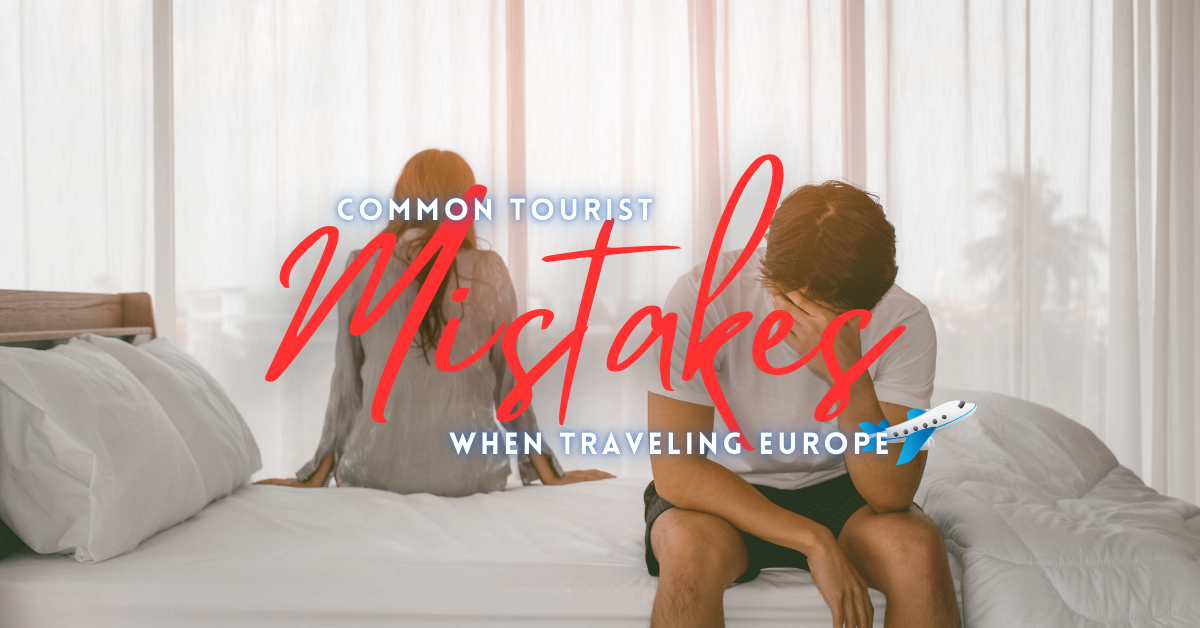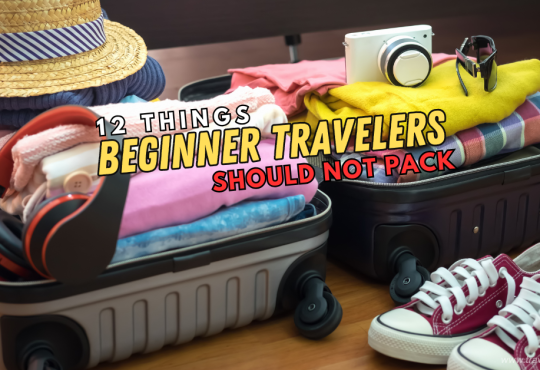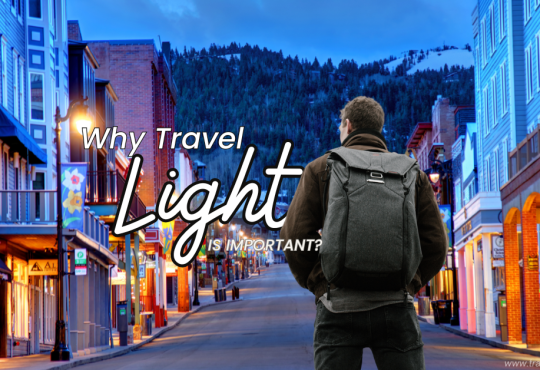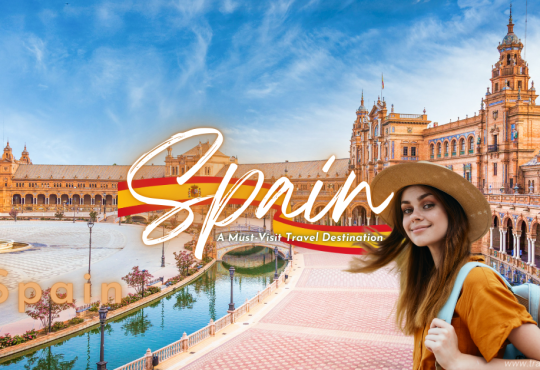
Traveling to Europe is a dream for many, with its rich history, stunning landscapes, and diverse cultures. However, even the most seasoned travelers can make mistakes that turn a dream trip into a hassle. Understanding common Europe tourist mistakes can help you navigate your adventure smoothly and make the most of your experience.
In this guide, we will explore the fifteen most common mistakes tourists make while traveling in Europe and provide practical tips on how to avoid them. From transportation blunders to cultural missteps, knowing what to steer clear of can enhance your journey and allow you to soak in all that Europe has to offer. Let’s dive in and ensure your European vacation is unforgettable for all the right reasons!
12 Common Tourist Mistakes When Traveling in Europe
1. Overpacking Your Itinerary
Mistake: Trying to See Too Much
Tourists often rush to see famous landmarks, leading to a frantic schedule that can result in fatigue and burnout. For example, travelers might plan to see the Colosseum, Vatican City, and the Sistine Chapel in one day without considering the time needed for each attraction. Such an approach can diminish the joy of exploring these sites.
How to Avoid It:
- Prioritize: Make a list of must-see destinations and experiences. For instance, when in Paris, prioritize the Louvre, but allow extra time for leisurely walks along the Seine River. Choose one major attraction per day, allowing for rest and exploration.
- Allow Flexibility: Leave a day or two open for spontaneous adventures. If you discover a local market or festival, embrace the opportunity. This adaptability will often lead to the most memorable experiences.
- Limit City Hopping: Consider base cities. For example, if you’re in Italy, staying in Florence for a week allows easy day trips to Pisa and Siena without the stress of frequent packing and moving.
2. Ignoring Local Customs
Mistake: Disregarding Cultural Etiquette
Cultural norms can vary widely, and failing to observe these can lead to uncomfortable situations. For instance, in Italy, it’s customary to greet with “Buongiorno” (good morning) in shops. Not doing so can be seen as rude.
How to Avoid It:
- Do Your Homework: Use resources like Culture Trip or the local tourism board’s website to familiarize yourself with local customs. For example, in Greece, it’s considered polite to accept a drink or snack offered by your hosts.
- Learn Key Phrases: Investing a little time to learn phrases such as “please” and “thank you” can make a big difference. Using “merci” in France or “danke” in Germany shows respect for the local culture.
- Observe and Adapt: While dining in Spain, notice how locals might order several tapas to share. This communal style of dining fosters connection and should be embraced rather than opting for a solitary meal.
3. Failing to Use Public Transport
Mistake: Relying Solely on Taxis
While taxis are convenient, they can quickly become expensive, especially in cities like London and Paris. For example, a short taxi ride in Paris could cost significantly more than a subway ticket.
How to Avoid It:
- Familiarize Yourself with Public Transport: Before your trip, download the local public transportation apps and maps. In Barcelona, the TMB app provides real-time information for buses and metro lines, making navigation easy.
- Consider Walking or Biking: Exploring on foot not only saves money but also allows you to discover hidden gems. In cities like Amsterdam, biking is not just practical; it’s part of the local culture.
- Download Transport Apps: Use local apps to buy tickets in advance. In London, the Oyster card or contactless payments offer cheaper fares on public transport, making your travels more efficient.
4. Skipping Travel Insurance
Mistake: Traveling Without Coverage
Neglecting travel insurance can result in unexpected financial burdens due to health emergencies or trip cancellations. Medical care in countries like the United States is notably expensive, and if you fall ill or have an accident abroad, the costs can be astronomical.
How to Avoid It:
- Research Insurance Options: Look for comprehensive plans that cover not just medical emergencies but also trip interruptions and lost belongings. Sites like InsureMyTrip allow you to compare plans side-by-side.
- Compare Policies: Pay attention to reviews and claims processes. Some insurers have excellent customer service, which can make a difference when you need help during your travels.
- Read the Fine Print: Ensure that you understand the exclusions. For example, if you plan to participate in adventure sports like skiing, check that your policy includes coverage for those activities.
5. Not Booking in Advance
Mistake: Last-Minute Reservations
Failing to book key attractions can lead to missing out entirely or paying inflated prices. For example, last-minute tickets for the Eiffel Tower can be scarce, often resulting in long queues or sold-out days.
How to Avoid It:
- Plan Ahead: Make reservations for popular attractions several weeks in advance. Many sites offer timed entry, which can save you hours of waiting in line.
- Utilize Booking Sites: Use platforms like GetYourGuide or Tiqets for instant booking options and possible discounts. These sites often provide user reviews to help you make informed choices.
- Be Flexible with Dates: Consider visiting popular attractions on weekdays or during off-peak hours. Early morning visits often mean shorter lines and a quieter experience.
6. Underestimating Costs
Mistake: Not Budgeting Properly
Tourists often overlook costs associated with dining, attractions, and local transportation. For instance, a seemingly cheap hostel can quickly add up when you factor in expensive meals and daily transport fares.
How to Avoid It:
- Create a Realistic Budget: Consider all aspects of your trip, including daily meals, local transport, and attraction fees. For example, a meal in a tourist area might cost double that of a local eatery.
- Use Travel Budgeting Apps: Track your spending with apps like YNAB (You Need A Budget) to keep your finances in check while traveling.
- Consider Free Attractions: Many cities have free walking tours or free museum entry days. Research and include these in your itinerary to save money while still enjoying the local culture.
7. Eating at Tourist Traps
Mistake: Dining in High-Traffic Areas
Restaurants in high-traffic tourist areas often offer overpriced, low-quality food. For instance, dining near major landmarks like the Trevi Fountain in Rome can result in a disappointing meal.
How to Avoid It:
- Explore Local Areas: Walk a few blocks away from main attractions to find local favorites. In Florence, Trattoria Mario is a local gem known for authentic Tuscan cuisine.
- Ask Locals for Recommendations: Engage with locals or your hotel staff for their favorite dining spots. Locals often know the best places for authentic cuisine away from the tourist crowds.
- Try Street Food: Food stalls often provide affordable and delicious options. For instance, trying a currywurst in Berlin or a gelato in Italy can offer a delightful culinary experience without the hefty price tag.
8. Neglecting to Check Visa Requirements
Mistake: Assuming Visa-Free Entry
Assuming you can enter all European countries without a visa can lead to unpleasant surprises at immigration. For example, while many nationalities can travel within the Schengen Zone without a visa, others may need one for specific countries like the UK or Ireland.
How to Avoid It:
- Research Visa Requirements: Use official government websites to check visa requirements for each country you plan to visit. Make sure to verify the length of stay and any entry requirements.
- Apply for Visas Early: If visas are necessary, allow ample time for processing. Some countries may require you to apply weeks in advance, especially during peak seasons.
- Keep Documents Handy: Always carry copies of your important travel documents, including your itinerary, hotel reservations, and proof of onward travel, to present at immigration if needed.
9. Disregarding Safety Precautions
Mistake: Not Staying Alert
While Europe is generally safe for tourists, cities like Barcelona and Rome are known for pickpocketing. Tourists often become easy targets, especially in crowded areas or during busy events.
How to Avoid It:
- Stay Aware of Your Surroundings: Be vigilant in crowded places, and avoid carrying valuables in easily accessible pockets. Use anti-theft bags that are hard to open without your knowledge.
- Use Anti-Theft Bags: Opt for crossbody bags with secure zippers and hidden compartments. Brands like Pacsafe offer stylish options designed for travel security.
- Keep Valuables Secure: Leave expensive items in your hotel safe and only carry what you need for the day. Use money belts or neck pouches to keep cash and passports safe.
10. Overlooking Local Transportation Options
Mistake: Not Researching Local Transport
Many travelers miss out on efficient transportation options. For example, many cities have convenient tram systems that can save time and money compared to taxis.
How to Avoid It:
- Research Local Transport: Before arriving, look up the available transportation methods in your destination. In Vienna, for instance, trams are a popular way to navigate the city and see the sights.
- Purchase Multi-Day Passes: If you plan to use public transport frequently, buying a multi-day pass can save money. For example, the Prague travel pass covers all forms of public transport, including buses, trams, and the metro.
- Use Ride-Sharing Apps: In less accessible areas, consider ride-sharing services like Uber or Lyft, which can be more convenient than taxis. These apps often provide upfront pricing and estimated arrival times.
11. Not Staying Connected
Mistake: Forgetting About Connectivity
In today’s digital age, having access to the internet is crucial for navigation and communication. Tourists often find themselves lost without a map or unable to contact their accommodations.
How to Avoid It:
- Get a Local SIM Card: Buying a local SIM card can provide affordable data access. For example, in many European countries, providers like Vodafone offer tourist packages with data plans.
- Download Essential Apps: Install useful apps before traveling, such as Google Maps, translation apps, and local transportation apps. Google Maps allows you to download offline maps, which can be helpful in areas with poor signal.
- Stay Charged: Bring a portable charger to ensure your devices are always ready. This is particularly important when you’re out exploring all day, and you might need your phone for navigation or translation.
12. Ignoring Travel Blogs and Guides
Mistake: Not Utilizing Available Resources
Many tourists underestimate the value of travel blogs and guides, missing out on insider tips and hidden gems. Travel blogs often offer real-world experiences that guidebooks cannot capture.
How to Avoid It:
- Read Travel Blogs: Blogs can provide personal insights, reviews, and recommendations that guidebooks might miss. Look for blogs that focus on the specific countries or cities you’ll visit. For example, “Travel and Shops” and “Nomadic Matt” offer valuable travel tips and itineraries.
- Join Travel Forums: Engage with fellow travelers on forums like TripAdvisor or Reddit for real-time advice. You can ask questions about your specific itinerary and receive feedback from those who have traveled recently. Forums are great places to discover lesser-known attractions and dining spots.
- Follow Social Media Influencers: Many travel influencers share useful tips and unique places to visit. Following them on platforms like Instagram or TikTok can inspire your travel plans. Use hashtags relevant to your destinations to uncover hidden gems.
13. Not Being Prepared for Walking
Mistake: Underestimating the Need for Walking
Europe is known for its walkable cities, and many attractions are best accessed on foot. Tourists often underestimate the physical demand of walking long distances, leading to exhaustion.
How to Avoid It:
- Get in Shape Before Traveling: If you’re not accustomed to walking long distances, try to build up your stamina before your trip. Engage in regular walking or hiking in the weeks leading up to your departure.
- Wear Comfortable Shoes: Invest in quality walking shoes that provide support and comfort. Brands like Merrell and Salomon offer stylish options that are perfect for city exploration.
- Plan for Breaks: Schedule downtime in your itinerary to rest. Find a café or park where you can relax and recharge, especially during long sightseeing days.
14. Sticking to Tourist Hotspots
Mistake: Overly Relying on Popular Attractions
While iconic landmarks are a must-see, limiting your experience to these sites can lead to a cookie-cutter travel experience. For example, visiting the Eiffel Tower is great, but it’s also important to explore lesser-known neighborhoods in Paris.
How to Avoid It:
- Explore Alternative Attractions: Research less touristy areas that offer authentic experiences. For example, instead of just visiting the Colosseum, explore Trastevere, a charming neighborhood in Rome with cobblestone streets and local eateries.
- Attend Local Events: Check local listings for festivals, concerts, or art exhibitions happening during your visit. These events can provide a glimpse into local culture that major tourist spots might not offer.
- Consider Guided Tours: Look for small-group tours that focus on off-the-beaten-path experiences. Many local guides can provide insights into hidden gems and unique stories about the area.
15. Talking Too Loudly
Mistake: Not Respecting the Local Noise Level
Tourists often forget that different cultures have varying standards for noise levels, particularly in quieter settings such as cafes and public transportation. Speaking too loudly can draw unwanted attention or even irritation from locals.
How to Avoid It:
- Observe Local Norms: Pay attention to how locals interact. If you notice quieter conversations, adjust your volume accordingly. In many European countries, maintaining a moderate volume is appreciated.
- Be Mindful in Public Spaces: When using public transportation, keep conversations at a lower volume and avoid loud phone calls. Respecting this norm helps create a more pleasant environment for everyone.
- Practice Good Manners: If you’re in a restaurant or café, be courteous to staff and fellow patrons. Saying “please” and “thank you” in the local language can help foster goodwill and a friendly atmosphere.
Traveling in Europe: Mistakes can be Avoided
Traveling in Europe can be an incredible experience filled with adventure, culture, and unforgettable memories. However, being aware of the common Europe tourist mistakes and taking proactive steps to avoid them is key to a smooth trip. By planning ahead, embracing local customs, and staying aware of your surroundings, you can ensure that your journey through Europe is as enjoyable and hassle-free as possible.
Remember, the goal is not just to see the sights but to immerse yourself in the culture and create lasting memories. By avoiding these mistakes and staying informed, you can fully enjoy your European adventure and make the most of every moment. Embrace the unexpected, cherish the connections you make, and let each experience enrich your journey through this beautiful continent.





